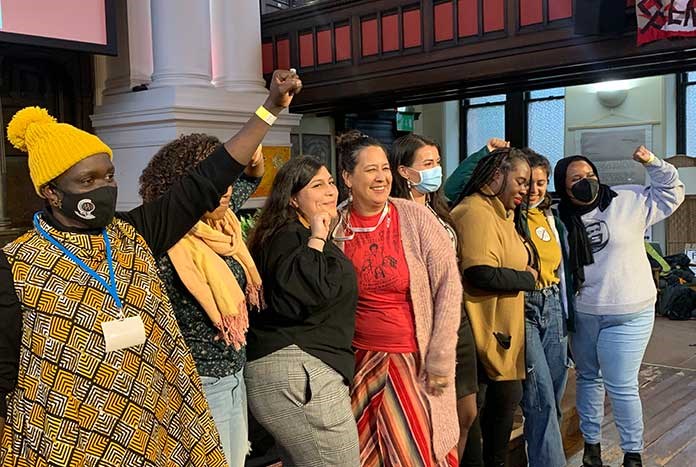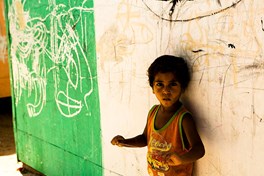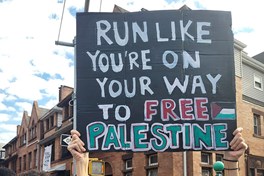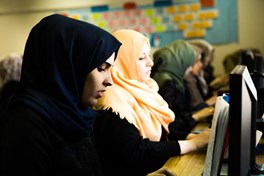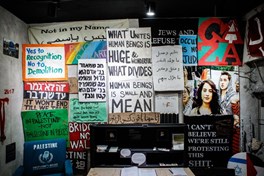“Ahead of the conference, many environmental scholars and activists were sceptical about what the outcome would be — claiming that promises from the Paris Agreement were still yet to be met. This sentiment is mainly fuelled by the perpetrators of the climate crisis, such as the UK and the US, taking centre stage at the negotiating table.” Amos Research Intern Fleur Boya writes from Glasgow.
A Grassroots Feminist Path to Climate Justice hosted by COP26 Coalition, Glasgow — November 2021
The people in power can continue to live in their bubble filled with their fantasies, like eternal growth on a finite planet and technological solutions that will suddenly appear seemingly out of nowhere and will erase all of these crises just like that. All this while the world is literally burning, on fire, and while the people living on the front lines are still bearing the brunt of the climate crisis. Greta Thunberg — 2021
The 2021 United Nations Climate Change Conference (COP26) was the 26th United Nations Climate Change conference, held in Glasgow in November 2021. It is the first major global Climate Change Conference since COP21 in 2015, which led to The Paris Agreement, an international treaty on climate change, which covers climate change mitigation, adaptation, and finance. The major commitments made from the agreement were to ensure greenhouse gas emissions reach net zero, and ensure that the rate of warming doesn’t exceed 1.5 degrees (it is currently at 2.4).
Ahead of the conference, many environmental scholars and activists were sceptical about what the outcome would be — claiming that promises from the Paris Agreement were still yet to be met. This sentiment is mainly fuelled by the perpetrators of the climate crisis, such as the UK and the US, taking centre stage at the negotiating table.
During COP15 in 2009, another pledge was made that countries in the Global South would receive $100bn a year to tackle the devastating impacts of climate change — a pledge that we have yet to see fulfilled. Today, as a result of these broken promises and pledges, many people were not optimistic about COP26. Leading up to the conference, Swedish climate activist Greta Thunberg echoed the general scepticism about the event — stating that it is most likely going to be a “greenwashing PR campaign”.
Ahead of the conference, many environmental scholars and activists were sceptical about what the outcome would be — claiming that promises from the Paris Agreement were still yet to be met.
However, people came together in Glasgow to channel their scepticism into counter-COP26 events — events that put the most affected and most vulnerable countries and communities at the centre of the conversation, emphasising that COP26 fails to acknowledge the disproportionate impacts of the climate crisis in the Global South. The COP26 Coalition, She Changes Climate and Extreme Hangout held seminars and panels with activists from all over the Global South and gave them a platform to share their insight into how the climate crisis is destroying their countries, and how they have taken matters into their own hands to mitigate it.
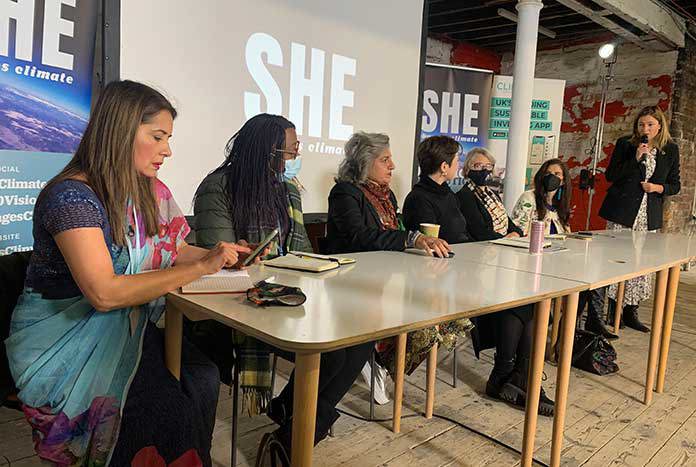
Session: “How women all over the world are standing up and bravely taking action to fight the climate and ecological crisis” hosted by She Changes Climate — Glasgow, November 2021
— — — — — — —
One of the most moving cases at COP26 Coalition was shared by Kato Ewekia Taomia, the only climate activist who made it to Glasgow from Tuvalu, an independent island nation in the South Pacific. He spoke about the devastating reality that his might be the last generation to live on Tuvalu.
A day earlier, Tuvalu’s Foreign Minister Kofe had given a speech to COP26 leaders standing knee-deep in seawater in a bid to raise awareness on how his low-lying Pacific island nation is on the front line of climate change and could literally disappear within 10 years because of rising sea levels and land erosion. When Kato was asked where he would move to once Tuvalu was underwater, he simply replied: “I’ll drown with my country; I shouldn’t have to move”.
Leading up to the conference, Swedish climate activist Greta Thunberg echoed the general scepticism about the event — stating that it is most likely going to be a “greenwashing PR campaign”.
Members of the Amos team had the privilege of meeting a number of young female climate activists from different parts of Africa, who shared the impact of the climate disaster in their respective countries and their experiences mitigating this crisis as a woman. The UN reports that 80% of the people who will be displaced by climate change will be women. In 2021 alone, 4 million girls in lower-income countries will have been prevented from completing their education due to climate-related events (Malala Fund, 2021).
Jakapita Kandanga from Namibia, part of the Fridays for Future MAPA movement, shared with us the links between the climate crisis in rural areas, and young women coming onto the streets of the capital city. Crops are failing, and young people come to the cities in search of a better life; however, youth unemployment is at 50% in Namibia. Many young women experience violence on the streets and even die there, Jakapita shared, but by that point the government don’t even care because they are stigmatised as sex workers.

Panel: A Grassroots Feminist Path to Climate Justice hosted by COP26 Coalition — Glasgow, November 2021
— — — — — — —
Unfortunately, many female climate activists found that they did not have the support from their own government to attend COP26 — to be the voice of climate injustice in their communities. Disha Ravi, a young climate activist from Bengaluru, India and leader of the Fridays for Future movement in India, was denied the right to attend COP26 due to her passport being withheld, despite having applied for it 88 days prior. She states that she wished to attend COP26 for “accurate reportage of the severity of the collapse of biodiversity and ecosystems” in India, but that instead, “world leaders have reduced COP26 to a PR exercise”.
“I’ll drown with my country; I shouldn’t have to move”. Kato Ewekia Taomia — Tuvalu, South Pacific
In Glasgow, we heard a lot of stories from frontline activists from countries that are most affected by climate change. Many were moving stories about the livelihoods that have been destroyed and the little efforts that their governments have done to mitigate the impact. It can be discouraging to think about how activists from small communities in the Global South take on such a massive issue, seemingly on their own — their efforts must feel like a drop in the ocean.
The real and lasting difference to mitigating the climate crisis, won’t come just from trees being replanted in Senegal or educating children in Kenya about environmental conservation, but from holding fossil fuel companies and their investors to account. Since 1988, only 100 companies have been the source of more than 70% of the world’s greenhouse gas emissions, thus the total suspension of fossil fuel investments by corporations and governments is integral to giving the Global South hope for a better, fairer future.
When fossil fuel industries make up the largest delegation at a global climate conference, where the most affected countries are only given permission to observe and not contribute — it makes climate activism in the Global South feel like an exhausting fight.
Unfortunately, many female climate activists found that they did not have the support from their own government to attend COP26 — to be the voice of climate injustice in their communities.
It also felt like there was almost a handing-over of the baton in some sessions at the Cop26 Coalition, from veteran activists to the next generation. Nnimmo Bassey, Nigerian climate activist who has campaigned for climate justice in Africa for over 20 years, stated during a COP26 coalition session: “Beyond wearing masks, we are also walking around blindfolded. We do not believe what is before our very eyes. Anything above 1 degree celsius is a death sentence for certain places. This is why the Paris Agreement is a document of hypocrisy. This may be my last COP because it is a ‘Conference of Polluters’. Without the People’s Summit, it’s pointless.”
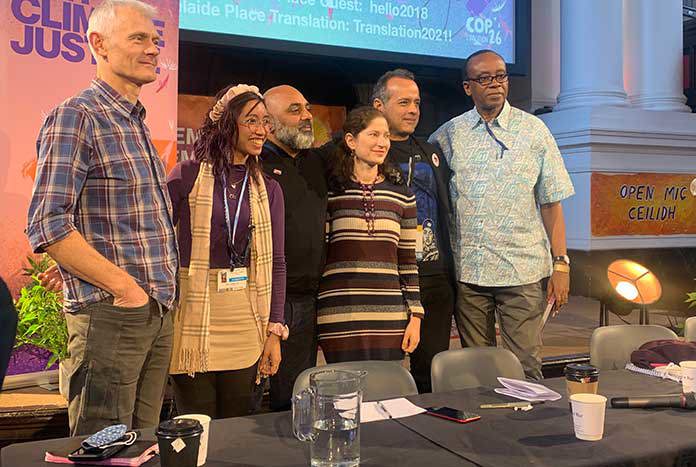
Solidarity: “Our time is now” session hosted by COP26 Coalition — Glasgow, November 2021
— — — — — — —
Nonetheless, we find hope in solidarity, in knowing that the road to climate justice is not a lonely one. Mitzi Jonelle, Disha Ravi, Vanessa Nakate and Anita Soina, young female leaders of the climate movement in the Global South, had been in touch virtually, and supported each other’s activism for many years before finally meeting in person in Glasgow. Their solidarity in fighting the climate crisis spanned thousands of miles, and became even more concrete as they protested in Glasgow together side-by-side.
It’s so clear that the climate crisis is fuelling existing inequalities. At Amos, with our partners CEPAD in Nicaragua, we invest in resilience and adaptations in the face of climate change; CEPAD's approach heavily revolves around women's leadership in local communities, since women are the most affected by the climate crisis.
In the wake of all we heard at COP26, we aim to further facilitate solidarity between female climate activists across the Global South by developing a platform that will not only help them to stay connected but also further the climate work/activism they’re doing in their respective communities.
— — — — — — —
Fleur Boya — Amos Trust Research Intern
